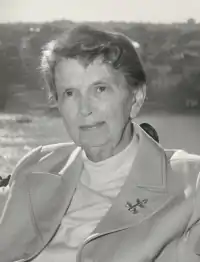Isobel Bennett
Isobel Ida Bennett AO 1984 (9 July 1909 – 12 January 2008) was one of Australia's best-known marine biologists. She (with Elizabeth Pope) assisted William John Dakin with research for his final book (Australian Seashores) regarded by many as "the definitive guide on the intertidal zone, and a recommended source of information to divers".[1] Following Dakin's death in 1950, she saw the book through to publication in 1952, and she continued to revise and reprint it with a complete revision in 1980 until 1992. In later editions, she was listed as a co-author, then first author.[2] She also wrote nine other books, and was one of the first women (along with Susan Ingham, Mary Gillham & Hope Macpherson) to go south with the Australian National Antarctic Research Expeditions (ANARE).[3]
Isobel Bennett | |
|---|---|
 | |
| Born | Isobel Ida Bennett 9 July 1909 |
| Died | 12 January 2008 (aged 98) |
| Nationality | Australian |
| Known for | Marine Science intertidal organisms |
| Awards | Mueller Medal (1982) Honorary Doctorate (University of Sydney, 1995) |
| Scientific career | |
| Fields | Marine biology |
| Institutions | University of Sydney |
Life and career
Isobel Ida Bennett was born in Brisbane in 1909 and educated at Somerville House leaving at the age of 16 when her family moved to Sydney.[4] She attended business college and gained employment in a patent office and for four years at the Associated Board of the Royal Schools of Music in Sydney, she joined the Zoology Department of the University of Sydney in 1933. From that time until 1948, she worked as secretary, librarian, demonstrator and research assistant to Professor W.J. Dakin, and then as research assistant to Professor P.D.F. Murray.
From 1950 she regularly led students to the Heron Island and Lizard Island Research Stations on the Great Barrier Reef and did field work on the Victorian and Tasmanian coasts. In 1959 she made her first visit to Macquarie Island with the ANARE relief ship, returning in 1960, 1965 and 1968. From 1959 to 1971, she was a Professional Officer at the University of Sydney, and received the first Honorary Master of Science from the University of Sydney in 1962. She was a temporary Associate Professor at Stanford University in 1963[5] and a delegate to the 11th Pacific Science Congress in Tokyo in 1966.
She retired in 1971, but remained an active author and researcher. From 1974 to 1979 she worked with the New South Wales Fisheries Department, and during that time, carried out fieldwork and surveys at the coastal rock platforms at Jervis Bay and Ulladulla, and on the coasts of Lord Howe Island, Norfolk Island and Flinders Island.
Bennett died in Sydney at the age of 98. Her papers and a collection of around 500 colour slides covering the last edition of Australian Seashores have been donated to the National Library of Australia and around 400 remaining slides.
Publications
In addition to the editions of Australian Seashore, Bennett wrote the following books;
- On the Seashore (1969) 21
- Shores of Macquarie Island (1971)
- The Great Barrier Reef (1971)
- A Coral Reef Handbook (1978)
- Discovering Lord Howe Island (1979)
- Discovering Norfolk Island (1983)
- Australia's Great Barrier Reef (1987)
- Australia's deepest blue mystery (1932)
References
- "CLASSIC DIVING BOOKS - Marine sciences - Australian authors". netspace.net.au.
- "Papers of Isobel Bennett". nla.gov.au.
- . She had one genus and five species of marine organisms (three being from the Great Barrier Reef)Marine scientist Bennett dies, aged 98 - ABC News (Australian Broadcasting Corporation)
- "Interviews with Australian scientists". science.org.au. Archived from the original on 18 January 2008. Retrieved 18 March 2009.
- Centre, The University of Melbourne eScholarship Research. "Bennett, Isobel Ida - Biographical entry - Encyclopedia of Australian Science". www.asap.unimelb.edu.au.
Further reading
- Moyal, Ann (March 2015). "Isobel Bennett, doyenne of the seashores" (PDF). The National Library of Australia Magazine. 7 (1): 14–17. Retrieved 17 April 2015.